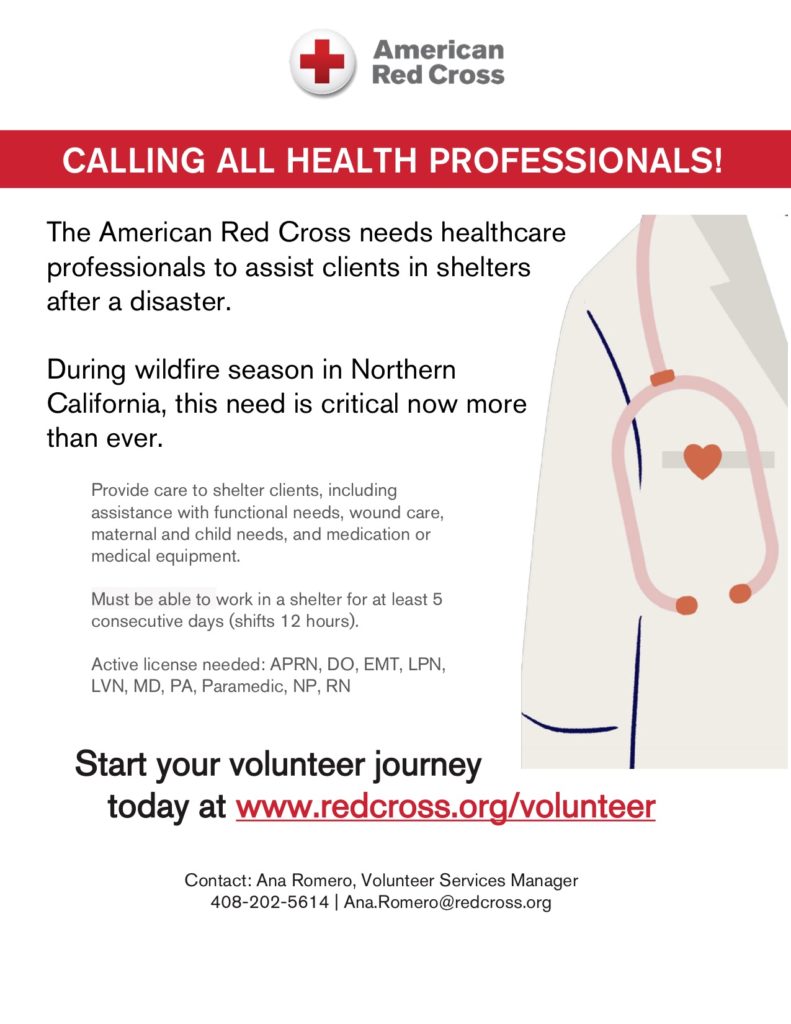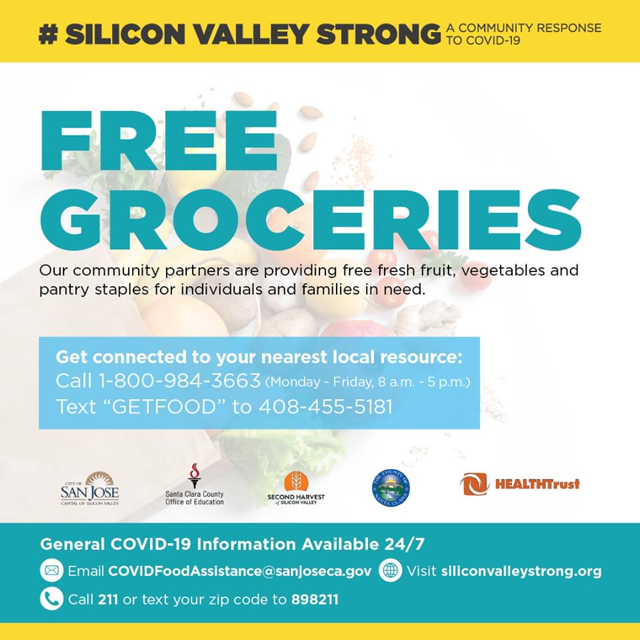
Health
SC County Can Use Your Help to Decrease Spread of COVID-19
Volunteers, even remote volunteers, are needed by Santa Clara County to help fight COVID-19. By completing a short volunteer survey, you can be best matched to role(s) that use your skill set. Each role will support front line staff and first responders, creating a healthier, safer community. Whether you work in health care or not, talents of all kind are welcome and encouraged.
Currently, there is a significant need for volunteers of all types to support staff in a variety of settings, including remotely. See the web site, below for a more complete list.
Please indicate how you can help by filling out a survey at: https://www.surveymonkey.com/r/BMZ9GCM
There are Frequently Asked Questions on the county web site here: https://www.sccgov.org/sites/covid19/Pages/i-can-help.aspx
Food Assistance … Fannie Young
Silicon Valley Strong in response to Covid-19 offers FREE GROCERIES
Call: 1-800-984-3663 (Monday-Friday 8 AM to 5 PM)
Email: COVIDFoodAssistance@sanjoseca.gov
Text: “GETFOOD” to 408-455-5181
Visit: siliconvalleystrong.org
A Doctor’s Coronavirus Advice … Ken Schieck
1) NO HANDSHAKING! Use a fist bump, slight bow, elbow bump, etc.
2) Use ONLY your knuckle to touch light switches. elevator buttons, etc.. Lift the gasoline dispenser with a paper towel or use a disposable glove.
3) Open doors with your closed fist or hip – do not grasp the handle with your hand, unless there is no other way to open the door. Especially important on bathroom and post office/commercial doors.
4) Use disinfectant wipes at the stores when they are available, including wiping the handle and child seat in grocery carts.
5) Wash your hands with soap for 10-20 seconds and/or use a greater than 60% alcohol-based hand sanitizer whenever you return home from ANY activity that involves locations where other people have been.
6) Keep a bottle of sanitizer available at each of your home’s entrances. AND in your car for use after getting gas or touching other contaminated objects when you can’t immediately wash your hands.
7) If possible, cough or sneeze into a disposable tissue and discard. Use your elbow only if you have to. The clothing on your elbow will contain infectious virus that can be passed on for up to a week or more!
What I have stocked in preparation for the pandemic spread to the US:
1) Latex or nitrile latex disposable gloves for use when going shopping, using the gasoline pump, and all other outside activity when you come in contact with contaminated areas.
Note: This virus is spread in large droplets by coughing and sneezing. This means that the air will not infect you! BUT all the surfaces where these droplets land are infectious for about a week on average – everything that is associated with infected people will be contaminated and potentially infectious. The virus is on surfaces and you will not be infected unless your unprotected face is directly coughed or sneezed upon. This virus only has cell receptors for lung cells (it only infects your lungs) The only way for the virus to infect you is through your nose or mouth via your hands or an infected cough or sneeze onto or into your nose or mouth. 2) Stock up now with disposable surgical masks and use them to prevent you from touching your nose and/or mouth (We touch our nose/mouth 90X/day without knowing it!). This is the only way this virus can infect you – it is lung-specific. The mask will not prevent the virus in a direct sneeze from getting into your nose or mouth – it is only to keep you from touching your nose or mouth. 3) Stock up now with hand sanitizers and latex/nitrile gloves (get the appropriate sizes for your family). The hand sanitizers must be alcohol-based and greater than 60% alcohol to be effective. 4) Stock up now with zinc lozenges. These lozenges have been proven to be effective in blocking coronavirus (and most other viruses) from multiplying in your throat and nasopharynx. Use as directed several times each day when you begin to feel ANY “cold-like” symptoms beginning. It is best to lie down and let the lozenge dissolve in the back of your throat and nasopharynx. Cold-Eeze lozenges is one brand available, but there are other brands available.
My first test post
Today is the beginning of the rest of your life.
This is interesting
Brain Health
Experts recommend exercise for the brain
The Global Council on Brain Health (GCBH), an independent collaborative of scientists, physicians, scholars and policy experts convened by AARP to provide the best thinking on brain health for older adults, has issued recommendations around exercise and brain health, including:
Get 150 minutes a week of moderate-intensity aerobic exercise.
Incorporate strength training two or more times a week.
Lead a physically active lifestyle.
To stay motivated, consider exercising with other people.
